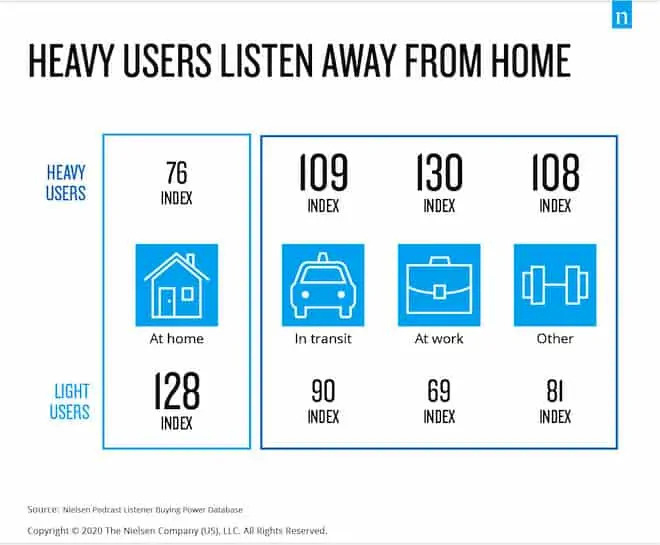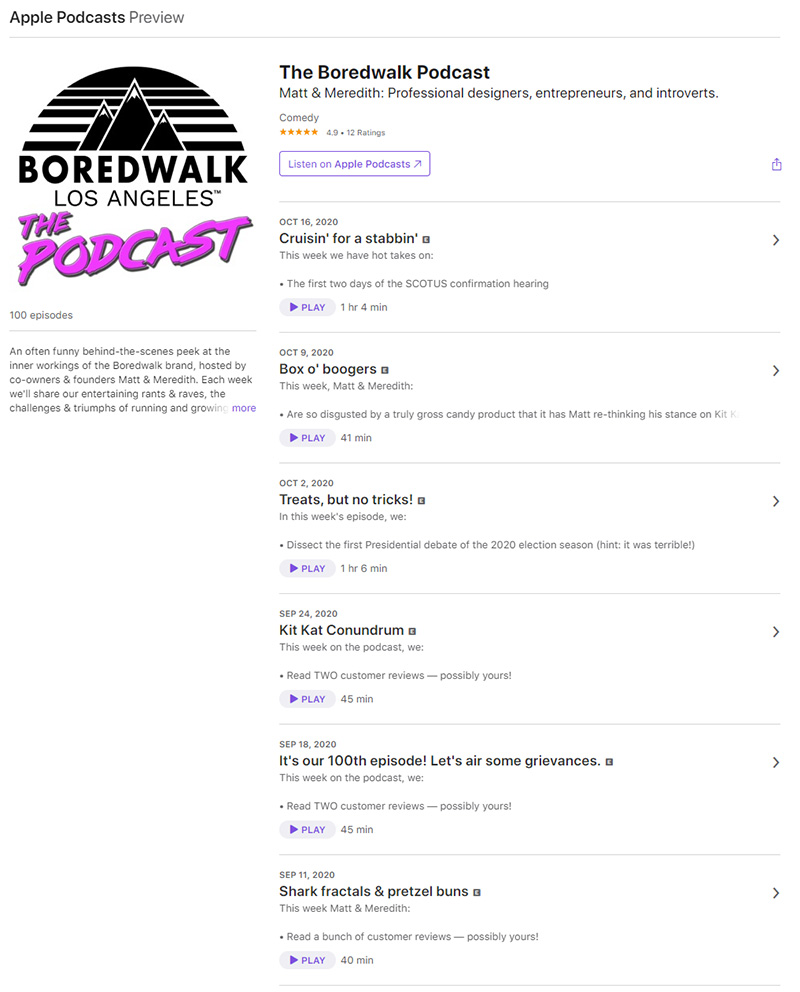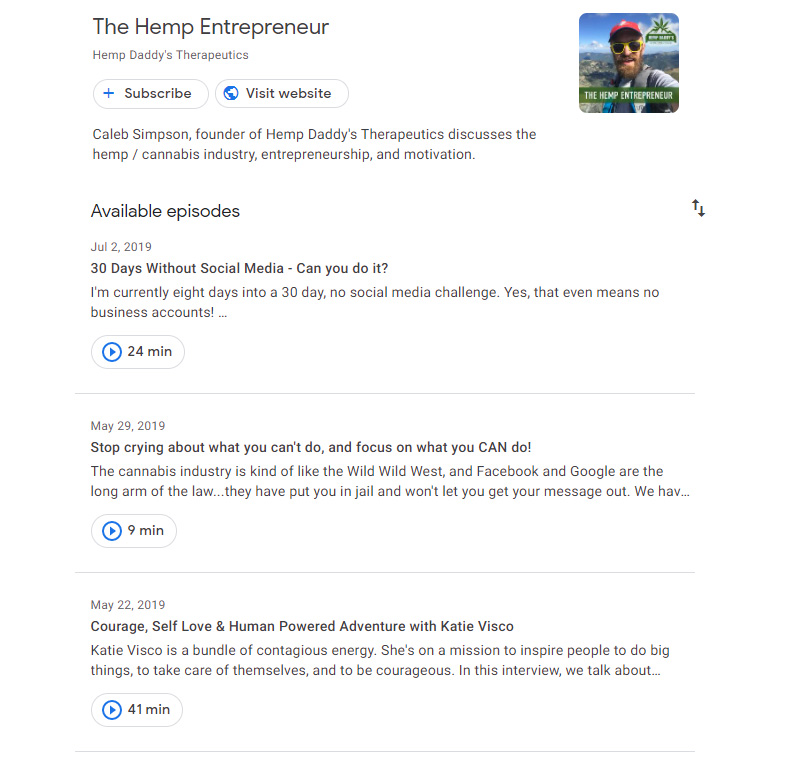So, is starting a podcast really worth the effort?
Most eCommerce business owners still shy away from the medium. Partly because of its relatively recent emergence in the digital landscape. But this practical, innovative, and inexpensive content marketing strategy is a clever way for your eCommerce business to connect with your audience on a more personal level. A new way to increase your brand awareness, and rake in the conversions.
Coming in bite-sized, audio format, eCommerce podcasts are getting hotter by the minute.
Podcasting has become one of the hottest topics in eCommerce conversations, with more and more eCommerce entrepreneurs starting to see it for the opportunity it is.
The Benefits of eCommerce Podcasting
eCommerce podcasts hold great untapped potential for building an online business as they:
- Play into permission marketing (good) concepts rather than push advertising (bad).
- Trigger high engagement and high reach numbers.
- Bring extensive micro-networking opportunities through interviewing others.
- Mean staying visible to those in your field when it comes to referrals.
- Expose your eCommerce business to other people’s audiences in your space.
But, how do you know being a podcast host would work for you? The medium is so new that it’s relatively untested.
Want to know who’s doing it well?
Today we explore the ways to kickstart your online store sales with a podcast. We’ll be seeing some real-world examples. And it gets better – we’ll be picking the brains of eCommerce store owners that have already tested the waters.
A Short Rundown: How to Start a Podcast That Sparks Interest and Drives Sales
There are four routes to take when stepping into the world of podcasting:
- Produce and host a podcasting show of your own. For example, host a Shopify podcast or running podcasts on multiple channels such as Apple or Overwatch.
- Commission a niche-related podcast to mention your brand or product.
- Get a third-party podcast production company to produce a podcast for you.
- Be interviewed by other podcasters that share a related eCommerce niche.
For online store owners who want to host a podcast on their own, the main keyword is ‘audience’. It’s pretty much where any success will come from. Your aim in podcasting is to create content that serves your target customers’ needs.
Deliver topics that are in line with their interests. It’s a slow but sure way of earning yourself a passive income. Because, once ‘on air’, your eCommerce podcast will be running while you sleep.
Say your eCommerce store is selling health supplements, so, you choose to host a podcast dedicated to mountain trail running. The assumption is that outdoor activities, such as mountain running, will be one of your buyers’ core interests.
To start a good niche podcast, eCommerce businesses have a wealth of topics to choose from. They just need to be carefully fine-tuned to their audience.
Once done the right way, you can use your podcast to put your eCommerce store right in front of your audience.
As folks over at QuietLight aptly put it:
Podcasting is something of a combination of the best qualities of radio (catching people on the go and in their cars, while becoming an intimate part of their daily routine) and television (broadcasting directly into homes).”
Podcasting is rapidly finding its way into the consumer’s everyday life. As reported by Neilsen, heavy users listen to their favorite shows mostly when away from home.

Source: podcastinsights.com
Hosting an eCommerce podcast is a great way to target your audience both inside and outside their homes. It presents plenty of opportunities to market your products and services.
In business, we know that success is directly linked to personability, that people buy from people.” Source: QuietLight
With a podcast, your audience can hear your voice and learn from you what your eCommerce store is all about, allowing an instant connection to your brand.
But how do you do this the right way?
Let’s learn from some of the best eCommerce podcasts out there.
The Best eCommerce Podcasts
You can always Google “Shopify podcasts” to find the best eCommerce podcasts to aspire to.
But today we bring you a select few with added commentary from real-world store owners and podcast hosts.
Boredwalk Podcast by Boredwalktshirts.com

Source: podcasts.apple.com
Boredwalktshirts.com is a successful eCommerce store specializing in on-trend, original apparel pieces. Using water-based inks and eco-friendly production processes they’re fulfilling their mission statement; aiming to minimize environmental impact.
The store owners, Matt and Meredith host a weekly podcast. And it’s been very successful in helping them gain traction with their customers.
The winning duo did a great job of targeting customers interested in their eCommerce niche. Their witty prints go hand in hand with the light tone of their podcast.
The podcast offers eCommerce insider tips and humourous social commentary on current events.
A solid rating of 4.9 on iTunes and rave reviews from their listeners underline how good they are at what they do.
Meredith Erin is the creative mind behind Boredwalk. She shares with us today how podcasting helped them build a brand for their online business:
You are right in your understanding of why we podcast. In part, it’s another way to help fans connect with our brand. The other thing it does is gives us a tool to connect with other creators who have an audience we want to get in front of.
If we are aware of a writer or comedian or food blogger who we think has an audience that would like what we do (and we think our audience would like them) we have them on the podcast so we have a piece of co-created content we can share with our respective fans and introduce our audiences to one another.”
Putting content out there has become a staple for many online businesses. Meredith shares how important content is to them as eCommerce business owners:
One thing that is different about our business is that we kind of think of ourselves as a content business. The products are content. Our social media posts are content. Our blog is content. Our emails are content. Our podcast is content.
The more content we put out in the world the more content there is to consume, share, engage with, etc. It makes our brand a lot stickier than brands that just sell a product.”
Next, she explains how podcasting sets their store apart from other eCommerce businesses:
We think of what we do as building a cult, not just building a brand, so we like to have a ton of content around our brand so fans can engage more and get more invested in what we do. This is a very difficult business model to really rip off because even if people rip off our product ideas they will never be able to keep up with us in terms of churning out all this really engaging witty content.
The podcast is just one aspect of this overall content strategy. I know people talk about content in terms of SEO, but we talk about it in terms of getting people more interested in our brand. We are doing it for humans, not Google bots.”
The Boredwalk podcast has been around for a while, with over 100 published episodes so far. But how can they tell the true impact of their eCommerce podcast and do they use any metrics to do that?
If you are looking for a really specific ROI metric with podcasting you are going to be disappointed. It is very hard to track for a variety of reasons. Since podcasts live on indefinitely, you could have an ep go live and someone who eventually becomes a very active customer may not stumble onto an episode until months after its release.
You also can’t necessarily tell that the pod is how anyone found you. If I have a popular food blogger on as a guest and she mentions her ep on her social media, her fans might listen to the ep and later google Boredwalk. I don’t know that they heard about Boredwalk because of that.
We do sometimes mention secret promo codes in episodes that are ONLY ever mentioned in an episode and we can see the codes being used, so we know fans listen because that’s the only way they would know about the code. We don’t do that all the time though.”
Next, Meredith goes on to explain why they choose podcasting over PPC advertising:
I like this approach to e-comm businesses in general, but it’s not for everyone.
You need to be able to turn out a lot of good content every week to approach your business this way, so you need a fairly creative person doing this. You could hire someone to do this for your business if you aren’t the right person for a task like this. It is a long game though.
If you want a low effort quick ROI option traditional marketing like PPC ads is probably going to be more appealing. The problem with just doing that is it has no staying power and it is a constant pay to play.
If you are trying to build a cult with a horde of dedicated fans you can’t do that with generic things like PPC ads. It’s not humanizing, and it won’t help an audience really relate to the brand and connect with it. I am sure it also depends on what you sell, but for a brand like ours, we like this approach.”
Hosting a show is one thing. But being a guest on other people’s shows goes a long way in attracting an audience to your eCommerce store. Meredith has a few thoughts on that matter too:
We have both been guests and had guests. Both of those things bring more of an audience to our brand. We hear anecdotally from people that they discovered Boredwalk because we were guests or someone they already followed was a guest on our show.”
Podcasting can get you some passive income. As you publish more and more episodes it’s more likely they’ll be picked up by new audiences. The evergreen nature of online content can ensure you a passive income for years to come.
As far as guesting on other pods (not your own show), I think it’s a great marketing idea if there are pods that have your audience. This is assuming the person who will be doing the guest appearance can come across as interesting, engaging, witty, etc. I like having our own show because then we have something to trade, meaning we can invite people to do our show in exchange for getting on their show.
Even if we want a guest who doesn’t have their own pod it’s great because we have an audience, so we can approach someone else who has tens of thousands of engaged followers and say “we have a similarly sized following and we’d love to have you on our show.” Now we are trading something of fairly equal value.
We have tens of thousands of social followers and tens of thousands of email subscribers. We can invite someone on the show and tell them their ep will be promoted to our whole audience and they can promote their ep to their audience.
This is a great marketing tool because it’s way more engaging than an ad and there’s no outlay of cash for either party. It also lives on the internet forever, so if a fan of our guest googles them they will stumble onto their podcast ep and probably listen and now they know about our brand too.”
Hemp Entrepreneur Podcast by HempDaddys.com

Source: podcasts.google.com
Hemp Daddy’s is a thriving eCommerce business that sells CBD oil. Although their product can be controversial, they’ve managed to market it successfully.
The consumption of CBD oil is differently regulated across the U.S. states. Still, its use for medical purposes has become integrated into the mainstream ad Hemp Daddy’s is one of the pioneers in selling CBD oil to those in need of pain relievers.
They’ve made a sustained effort to trigger customer engagement with their brand. With podcasting being a huge part of their success story.
Runners make up most of their intended audience, so it’s whom they target in their show. The topics gravitate around insights into the hemp industry, healthy lifestyles, and motivation.
Caleb Simpson, the online store owner, and podcast host, shares his worldly wisdom with us. Here are some tried-and-tested strategies he’s used to drive sales for his online business:
When I first started my CBD oil company back in August of 2018 I knew it would be a challenge.
Google and Facebook do not allow you to advertise CBD without some very clever tricks, but even then you can’t mention CBD which in my opinion can be very confusing for the customer, so it’s something I never pursued.
I had to get creative with my marketing, which led me to experiment with niche websites and podcasts.”
Other than being a host of his own show, Caleb has done plenty of paid sponsorships with other podcasters:
For example, the Trail Runner Nation Podcast had a live interview with me. It was an entire episode. So it was basically FREE advertising and was what really launched my business.
The buy-in for each podcast was different based on audience size, and the same was true for the niche websites I worked with.
I found that audience size wasn’t the be-all and end-all of effectiveness.”
Next, Caleb shares how effective these podcasting collaborations have been in driving revenue to his eCommerce business:
Below is a list of the podcasts and niche websites I worked with. Along with the ad spend and the sales generated from the partnership. I used a two-month time frame from the launch of the ad.
Some of these worked very well, others did not go so well.”
With eCommerce podcasts, it’s tricky to determine the true ROAS metrics. This is because many other success factors come into play.
While the No Meat Athlete Podcast didn’t generate a positive ROAS it does not account for the lifetime value of some of those customers. And since the podcast is evergreen I still have customers occasionally using that coupon code.”
Caleb has tried almost anything under the sun to promote his CBD eCommerce store. He’s also been interviewed by other eCommerce entrepreneurs in the CBD niche:
In addition to these paid sponsorships, I was also a guest on a total of 12 podcasts last year. Many of these came at no cost to me. They were fairly effective in generating a loyal customer base.”
The Hemp Daddy’s marketing model is a great case in point as to what you should or should not perhaps try on your own.
My take away from this is that podcasts can be VERY effective advertising, but you get the most bang for your buck as a guest on the shows.
The podcasts with smaller listenership performed better in almost all cases. My theory behind that is that their listeners support the show and haven’t been “ad dazed” by the high number of sponsored spots.
I plan on continuing to pursue podcasts and niche websites, but try to focus on my core audience and not deviate from that, as with the trial ad spend I did last month to the 40,000 audiences in the comedy podcast sector.”
Ready to Host Your Own Podcast?
There’s a fine line between failure and success, but hopefully the eCommerce entrepreneurs in our article have shone a light on the correct way to go about launching a successful podcast.
Knowing what works well in podcasting and how to drive sales to your eCommerce store? That’s huge.
Now you can fine-tune your content marketing efforts so they make sense for your eCommerce business. If being an eCommerce podcast host feels like too big a step then start small.
Get in front of your audience by being a guest on other podcasting shows. That’s a step closer to reaching out to new audiences in your space. A few more shows like that, and you’re on a fast track to full-fledged brand identity and more sales.
Learning from other successful eCommerce business owners is how you drive upwards and onwards in your online business. Stay up-to-date with the most recent eCommerce trends, tips, and ideas by joining the eCommerceFuel community.
Photo by pexels.com
 If you’ve used WordPress even just a little bit, you’ve probably come up against the fact that it’s really hard to add extra space into the editor. You can only hit “return” a couple of times before it starts eating…
If you’ve used WordPress even just a little bit, you’ve probably come up against the fact that it’s really hard to add extra space into the editor. You can only hit “return” a couple of times before it starts eating…